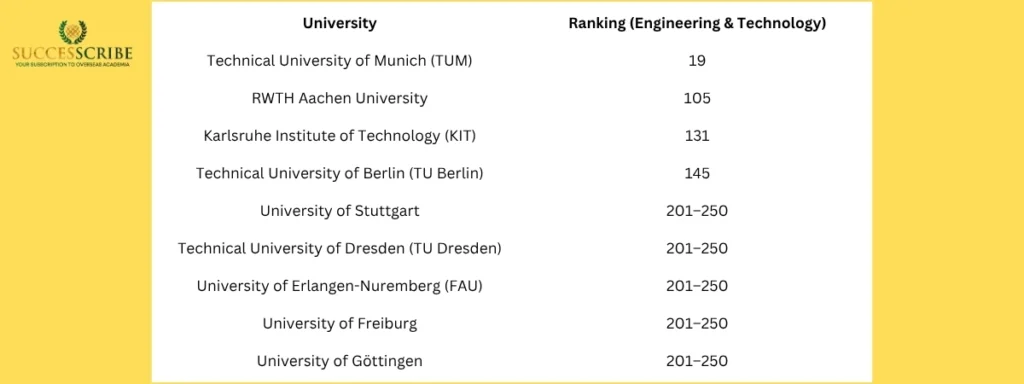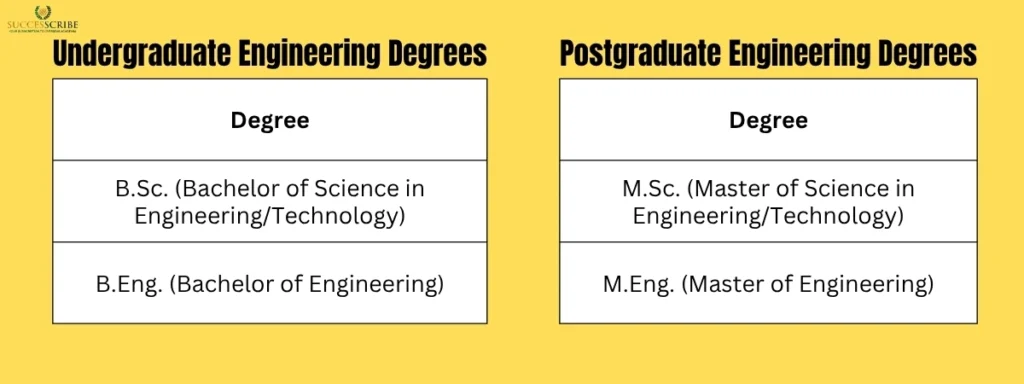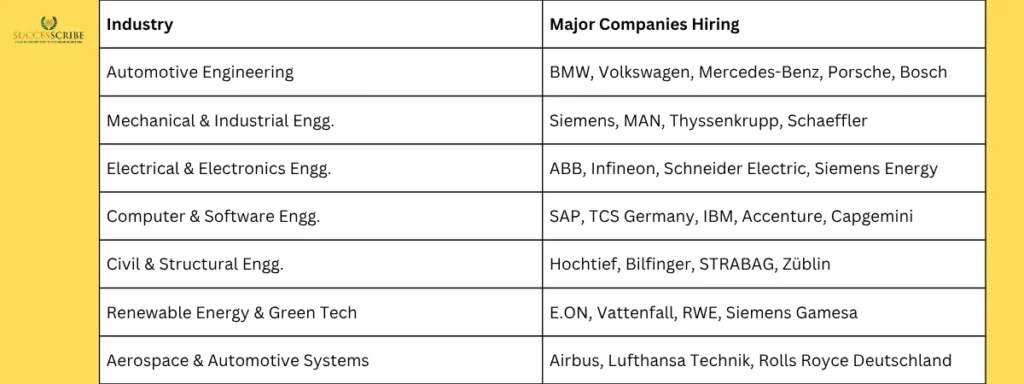Germany has long been recognized as a global leader in engineering, renowned for its precision, innovation, and industrial excellence. With a robust economy driven by advanced manufacturing, mechanical, electrical, and automotive engineering, Germany offers one of the most attractive destinations for Indian students seeking a world-class engineering education. Engineering in Germany for Indian Students offers world-class education, cutting-edge research opportunities, and exposure to a thriving industrial ecosystem, making Germany one of the most preferred destinations for aspiring engineers. In 2025, Germany continues to maintain its competitive edge in the global engineering market, commanding 16% of the worldwide mechanical engineering industry, underscoring its importance as a hub for technological advancement. With a looming shortage of skilled professionals – an estimated 178,000 engineers will be required by 2035 – Germany presents abundant opportunities for talented international students.
Key Highlights – Engineering in Germany for Indian Students
- Top Engineering Universities in Germany for Indian Students – Rankings, fees, key disciplines, and industry collaborations.
- Engineering Fees in Germany – Public vs. private universities, tuition costs, and semester contributions.
- JEE Requirements – Whether JEE is mandatory and advantages of a high JEE Advanced score.
- Types of Engineering Degrees in Germany – B.Sc., B.Eng., M.Sc., M.Eng., research vs. industry-focused programs.
- Popular Engineering Disciplines – Mechanical, Electrical, Computer Science, Civil, Automotive, Aerospace, Industrial, Environmental.
- Admission Requirements for Indian Students – Academic eligibility, language proficiency, entrance exams, and application process.
- Career Prospects After Engineering in Germany for Indian Students – High-paying jobs, top industries, post-study work visas, and emerging fields.
- Emerging Engineering Fields in Germany – AI & robotics, EV & automotive electronics, renewable energy, data & cloud engineering.
Top Engineering Universities in Germany for Indian Students

Indian students seeking Engineering courses in Germany can choose from top-ranked universities like Technical University of Munich, RWTH Aachen, and Karlsruhe Institute of Technology, which are known for their excellence in mechanical, electrical, and computer science engineering.
| University | Ranking (Engineering & Technology) | Annual Semester Fees | Key Engineering Disciplines | Industry Collaborations |
| Technical University of Munich (TUM) | 19 | €144–€300 | Mechanical, Electrical, Aerospace, Computer Science, Robotics | BMW, Siemens, Google, Airbus |
| RWTH Aachen University | 105 | €300–€350 | Mechanical, Civil, Chemical, Electrical, Materials Science | Bosch, Ford, Thyssenkrupp |
| Karlsruhe Institute of Technology (KIT) | 131 | €150–€300 | Mechanical, Electrical, Industrial, Computer Science | Daimler, SAP, Siemens |
| Technical University of Berlin (TU Berlin) | 145 | €300–€350 | Civil, Mechanical, Electrical, Environmental Engineering | Bombardier, Deutsche Bahn |
| University of Stuttgart | 201–250 | €150–€300 | Automotive, Aerospace, Mechanical, Civil Engineering | Porsche, Bosch, Daimler |
| Technical University of Dresden (TU Dresden) | 201–250 | €150–€300 | Mechanical, Electrical, Environmental, Materials Science | Volkswagen, Siemens, Infineon |
| University of Erlangen-Nuremberg (FAU) | 201–250 | €150–€300 | Electrical, Mechanical, Industrial, Computer Science | Siemens, Adidas, Schaeffler |
| University of Freiburg | 201–250 | €150–€300 | Microsystems Engineering, Mechanical, Electrical | Bosch, Fraunhofer Institute |
| University of Göttingen | 201–250 | €150–€300 | Electrical, Mechanical, Computer Science | Continental, Volkswagen |
Apply to Top German Universities
Make your application simple and stress-free with Successcribe
Get Expert Help NowEngineering Fees for Indian Students in Germany
One of the key advantages of Engineering in Germany for Indians is the affordable tuition fees at public universities, with many programs being tuition-free, while private universities offer world-class facilities at higher fees. Germany offers a range of fee structures for engineering programs, varying by university type and program level.
1. Public Universities (Most Popular Choice)
Germany’s public universities are renowned for their high-quality engineering programs and are the preferred choice for Indian students due to their affordability.
- Tuition Fees: Most public universities do not charge tuition fees for undergraduate (Bachelor’s) and many postgraduate (Master’s) programs. Instead, students pay a semester contribution.
- Semester Contribution: Typically ranges from €250 to €350 per semester (approximately ₹22,500 to ₹31,500). This fee often includes:
- Access to university facilities
- Public transportation pass (Semesterticket)
- Student services and administrative costs
Example: At the Technical University of Munich (TUM), tuition fees for international students from non-EU countries range from €2,000 to €3,000 per semester for Bachelor’s programs, and €4,000 to €6,000 per semester for Master’s programs, depending on the specific program.
2. Private Universities
Private institutions in Germany generally charge higher tuition fees compared to public universities.
- Tuition Fees: Typically range from €25,000 to €40,000 per year (approximately ₹22 lakh to ₹36 lakh). These fees depend on the university and the specific program.
| Type of University | Tuition Fees | Semester Contribution / Admin Fees | Total Approx. Cost per Semester | Notes |
| Public University | Mostly €0 (tuition-free) | €250–€350 (₹22,500–₹31,500) | €250–€350 | Includes student services, public transport, and admin costs. Many Master’s programs for non-EU students may have tuition €2,000–€6,000 per semester. |
| Private University | €25,000–€40,000/year (₹22–36 lakh) | Usually included in tuition | €12,500–€20,000 per semester | Fees vary depending on the program; often includes all services. |
Is JEE Required to Study Engineering in Germany for Indian Students?

For Indian students aspiring to pursue engineering in Germany, the Joint Entrance Examination (JEE) is not mandatory. German universities primarily consider 12th-grade marks and language proficiency for admissions. However, a strong JEE Advanced score can provide significant advantages.
1. Admission without JEE
- 12th Grade Completion: Students should have a solid academic record in Physics, Chemistry, and Mathematics (PCM). Most universities require 60–70% aggregate marks.
- Studienkolleg Requirement: Students whose 12th-grade qualifications are not equivalent to the German Abitur usually need to attend a Studienkolleg, a one-year preparatory course. After completion, they must pass the Feststellungsprüfung (FSP) to qualify for a Bachelor’s program
- Language Proficiency:
| English-Taught Programs | IELTS (6.0–6.5) or TOEFL (80+) |
| German-Taught Programs | B1/B2 German proficiency |
2. Advantage of JEE Advanced
A high JEE Advanced score can sometimes allow students to bypass the Studienkolleg and secure direct admission to German universities, especially in top engineering schools like:
- Technical University of Munich (TUM)
- RWTH Aachen University
- Karlsruhe Institute of Technology (KIT)
This provides a faster route to begin a Bachelor’s program without the additional preparatory year.
| Scenario | Requirement |
| Strong 12th-grade PCM marks, no JEE | Direct admission possible in some universities |
| Marks below university requirement | Studienkolleg + Feststellungsprüfung required |
| High JEE Advanced score | May bypass Studienkolleg, direct admission to Bachelor’s program |
Types of Engineering Degrees in Germany for Indian Students

Students exploring Engineering in Germany for Indian Students can opt for undergraduate programs like B.Sc. or B.Eng., and postgraduate programs like M.Sc. or M.Eng., depending on whether they prefer a research-oriented or industry-focused path. Germany offers a variety of engineering programs at both undergraduate and postgraduate levels. The degree names can differ slightly from what is common in India, so it’s important to understand the distinctions.
1. Undergraduate Engineering Degrees
| Degree | Equivalent in India | Duration | Focus / Notes |
| B.Sc. (Bachelor of Science in Engineering/Technology) | B.Sc. Engineering | 3–4 years | Focuses more on theoretical knowledge, research foundations, and scientific principles. Ideal for students aiming for Master’s programs or research. |
| B.Eng. (Bachelor of Engineering) | B.Tech / B.E. | 3–4 years | More practice-oriented than B.Sc. Includes applied engineering, internships, and hands-on projects. Preferred for students aiming for industry jobs. |
- Most German universities follow the B.Sc. or B.Eng. system now after adopting the Bologna Process.
- B.Sc. is often more research-focused; B.Eng. is more application/industry-focused.
- Students can pursue Master’s programs in Germany or abroad after completing these undergraduate degrees.
2. Postgraduate Engineering Degrees
| Degree | Equivalent in India | Duration | Focus / Notes |
| M.Sc. (Master of Science in Engineering/Technology) | M.Tech (India) | 1.5–2 years | Research-oriented, ideal for students aiming for R&D, Ph.D., or specialized technical roles. |
| M.Eng. (Master of Engineering) | M.Tech (Industry-Focused) | 1.5–2 years | Practice-oriented, includes applied projects, internships, and industry collaborations. Best for students aiming to work in the engineering industry. |
- M.Sc. programs are usually offered by universities with a strong research focus.
- M.Eng. programs are offered by Universities of Applied Sciences (Fachhochschulen), emphasizing practical experience and industry readiness.
- Students can work in Germany after graduation on a post-study work visa (up to 18 months).
Popular Engineering Disciplines in Germany
Germany offers a wide range of engineering programs across various specializations. Here’s an overview of the most sought-after disciplines for Indian students along with top universities offering them:
| Engineering Discipline | Key Focus Areas | Top Universities in Germany |
| Mechanical Engineering | Automotive engineering, manufacturing, robotics, thermodynamics | Technical University of Munich (TUM), RWTH Aachen University, Karlsruhe Institute of Technology (KIT), University of Stuttgart |
| Electrical & Electronics Engineering | Power systems, electronics, embedded systems, renewable energy | Technical University of Munich (TUM), TU Dresden, RWTH Aachen University, University of Stuttgart |
| Computer Science & IT Engineering | Artificial Intelligence, Data Science, Software Development, Cybersecurity | Technical University of Munich (TUM), RWTH Aachen University, University of Stuttgart, Karlsruhe Institute of Technology (KIT) |
| Civil & Structural Engineering | Infrastructure development, urban planning, sustainable construction | Technical University of Berlin, RWTH Aachen University, University of Stuttgart, TU Darmstadt |
| Automotive Engineering | Vehicle design, electric vehicles, automotive manufacturing | RWTH Aachen University, Technical University of Munich (TUM), Karlsruhe Institute of Technology (KIT), University of Stuttgart |
| Aerospace Engineering | Aircraft design, space systems, aerodynamics | Technical University of Munich (TUM), RWTH Aachen University, University of Stuttgart, TU Braunschweig |
| Industrial Engineering & Management | Process optimization, operations management, logistics | Technical University of Munich (TUM), RWTH Aachen University, Karlsruhe Institute of Technology (KIT), TU Darmstadt |
| Environmental Engineering | Renewable energy systems, water resources, sustainability | TU Berlin, RWTH Aachen University, Technical University of Munich (TUM), University of Stuttgart |
Want to Study in Germany?
Start your journey with Successcribe’s free expert guidance
Book a Free Session NowAdmission Requirements for Indian Students to Study Engineering in Germany
For Engineering in Germany as an Indian, admission requirements typically include completion of Class 12th (for undergraduate) or a relevant bachelor’s degree (for postgraduate), proficiency in English or German, and sometimes attendance of a Studienkolleg for students without equivalent qualifications. Germany is one of the most sought-after destinations for Indian students aspiring to pursue engineering. Admission requirements are straightforward but must be carefully met to ensure a smooth application process.
1. Academic Requirements
For Undergraduate Programs (B.Sc. / B.Eng.)
- Qualification: Completion of Class 12th (Senior Secondary) or equivalent.
- Stream: Must have studied Physics, Chemistry, and Mathematics (PCM).
- Minimum Score: Typically 70% or above in Class 12.
- Equivalent Certificate: Students may need a Fachhochschulreife or Abitur equivalency, assessed via the APS or Uni-assist system.
For Postgraduate Programs (M.Sc. / M.Eng.)
- Qualification: A Bachelor’s degree in Engineering or relevant discipline.
- Minimum Score: Generally 60–65% or higher.
- Specialization Match: The Bachelor’s degree should be in a related engineering field to the Master’s program applied for.
2. Language Requirements
| German-Taught Programs | English-Taught Programs |
| Required Level: B1/B2 or C1 in German (depending on the university). | Required Level: Proficiency in English for programs offered in English. |
| Accepted Certificates: TestDaF, Goethe-Zertifikat, DSH. | Accepted Certificates:IELTS: 6.5+ (no band below 6.0)TOEFL: 90+ |
3. Entrance Tests (If Applicable)
- Most German universities do not require standardized tests like GRE for admission in engineering Master’s programs.
- However, some universities or specific programs may ask for GRE scores or technical tests, especially for competitive programs like Computer Science or Aerospace Engineering.
4. Application Documents
Indian students must prepare and submit the following:
- Academic Certificates: Class 10, Class 12, and Bachelor’s degree (for Master’s).
- Transcripts: Detailed mark sheets with grading system.
- Passport: Valid passport with at least 18 months validity.
- Curriculum Vitae (CV/Resume): Highlighting academic and extracurricular achievements.
- Statement of Purpose (SOP): Explaining motivation, career goals, and why Germany.
- Letters of Recommendation: 1–2 letters from teachers or academic supervisors.
- Language Certificates: IELTS/TOEFL or German language certificates.
- Portfolio (if required): Some programs like Design or Industrial Engineering may request a portfolio.
5. Application Process
- Research & Shortlist Universities: Check program details, fees, language of instruction, and deadlines.
- Apply Online: Most universities use uni-assist or their own online application portal.
- Submit Documents: Upload all required documents carefully.
- Receive Admission Letter: Universities issue a Letter of Admission (LoA) once the application is approved.
- Apply for Student Visa: Submit LoA, financial proof, and other documents at the German Embassy or Consulate.
6. Financial Requirements
- Proof of financial resources is mandatory to get a German student visa.
- Required Amount: Around €11,904–€12,000 per year (₹10–12 lakh).
Accepted Proof:
- Blocked account in Germany
- Scholarship certificate
- Bank statements or sponsor letters
7. Additional Notes for Indian Students
- APS Certificate: Not required for most engineering programs but may be requested by some universities.
- Preparatory Programs: Students who do not meet the direct admission requirements may need to attend a Studienkolleg (Foundation Course). This typically lasts 1 year and ends with the Feststellungsprüfung (FSP) exam.
- Deadlines:
Winter Semester: July–August
Summer Semester: January–February
Suggested Post: Highest paying companies in Germany
Career Prospects After Doing Engineering in Germany for Indian Students

Germany is one of the best countries in the world for engineers, offering exceptional career opportunities, high-paying jobs, and a strong post-study work environment. After completing your engineering degree in Germany – whether Bachelor’s or Master’s – you’ll find a thriving job market driven by innovation, technology, and global demand for skilled professionals. Engineering in Germany for Indian Students opens doors to high-paying jobs, internships, and post-study work opportunities in top industries like automotive, renewable energy, IT, aerospace, and industrial engineering.
Why Germany Is Ideal for Engineering Careers
Germany is known as the “Land of Engineers.” According to the Federal Employment Agency (Bundesagentur für Arbeit), engineers are among the top 10 most in-demand professions in Germany.
- There are currently around 130,000+ open engineering positions in Germany (as of 2025).
- The unemployment rate among engineers is below 2.5%, one of the lowest in Europe.
- Germany’s booming industries – automotive, renewable energy, mechanical engineering, and IT – consistently need skilled engineers.
Top Industries Hiring Engineers in Germany
| Industry | Major Companies Hiring | Average Annual Salary (€) | Average Annual Salary (₹) |
| Automotive Engineering | BMW, Volkswagen, Mercedes-Benz, Porsche, Bosch | €55,000–€75,000 | ₹50–₹69 lakh |
| Mechanical & Industrial Engg. | Siemens, MAN, Thyssenkrupp, Schaeffler | €50,000–€70,000 | ₹46–₹64 lakh |
| Electrical & Electronics Engg. | ABB, Infineon, Schneider Electric, Siemens Energy | €52,000–€68,000 | ₹48–₹63 lakh |
| Computer & Software Engg. | SAP, TCS Germany, IBM, Accenture, Capgemini | €55,000–€80,000 | ₹50–₹74 lakh |
| Civil & Structural Engg. | Hochtief, Bilfinger, STRABAG, Züblin | €48,000–€65,000 | ₹44–₹60 lakh |
| Renewable Energy & Green Tech | E.ON, Vattenfall, RWE, Siemens Gamesa | €50,000–€72,000 | ₹46–₹67 lakh |
| Aerospace & Automotive Systems | Airbus, Lufthansa Technik, Rolls Royce Deutschland | €60,000–€85,000 | ₹55–₹79 lakh |
Emerging Engineering Fields in Germany
| Emerging Field | Growth Outlook | Key Skills Required |
| Artificial Intelligence & Robotics | Very High (40% job growth by 2030) | ML, Automation, Python, Data Modelling |
| Renewable Energy & Sustainability | High (Driven by EU Green Deal) | Solar Systems, Wind Energy, Smart Grids |
| Automotive Electronics & EV Design | Very High (Tesla, BMW, Mercedes expanding) | Mechatronics, Battery Systems, Embedded Software |
| Civil Engineering & Smart Cities | Moderate to High | BIM, Project Management, Sustainable Materials |
| Data Engineering & Cloud Systems | High | Big Data, AWS, Cloud Integration |
Conclusion
Choosing Engineering in Germany for Indian Students is a smart and future-focused decision. Germany’s globally recognized universities, industry-driven curriculum, and affordable education create the perfect environment for aspiring engineers to thrive. With access to cutting-edge research, practical training, and a booming job market, Indian students can gain not only a world-class degree but also a rewarding international career. In every sense, Germany stands as the ultimate destination to turn engineering ambitions into real-world achievements.
FAQs
Is Germany a good destination for Indian students to study engineering?
Yes, Germany is one of the top destinations for Indian students due to its world-class universities, industry collaboration, affordable or tuition-free education, and strong career prospects in engineering.
What are the top universities for engineering in Germany?
Some of the best universities include Technical University of Munich (TUM), RWTH Aachen University, Karlsruhe Institute of Technology (KIT), Technical University of Berlin, and University of Stuttgart.
Do Indian students need to clear JEE to study engineering in Germany?
No, JEE is not mandatory. Admission is primarily based on Class 12th PCM marks, language proficiency, and sometimes entrance exams or preparatory courses like Studienkolleg.
Are engineering programs in Germany taught in English?
Yes, many universities offer English-taught Bachelor’s and Master’s programs. German language proficiency (B1/B2) is required for programs taught in German.
What are the career prospects after completing engineering in Germany?
Indian students have access to a strong job market in automotive, mechanical, electrical, IT, aerospace, and renewable energy sectors. Average salaries range from €50,000–€80,000 per year (₹46–74 lakh).
Related Post
Free education in Germany for Indian students
Benefits of doing masters in Germany
How many band required for Germany
German university entrance exam















